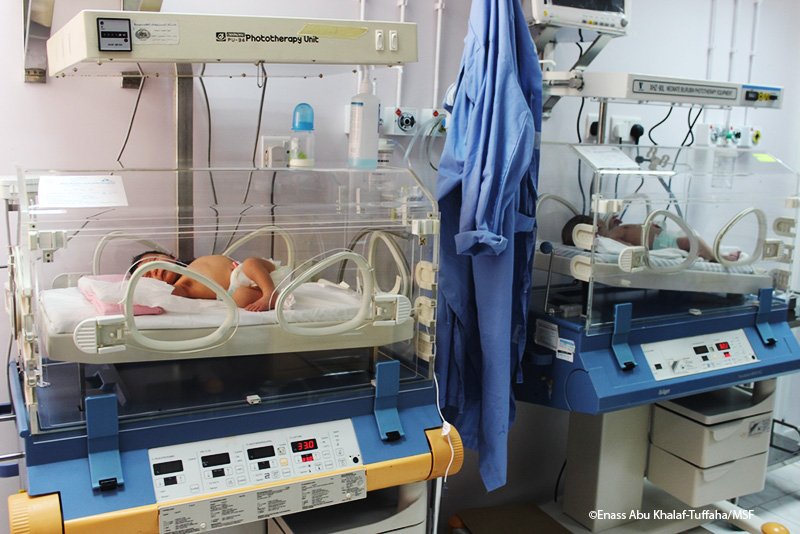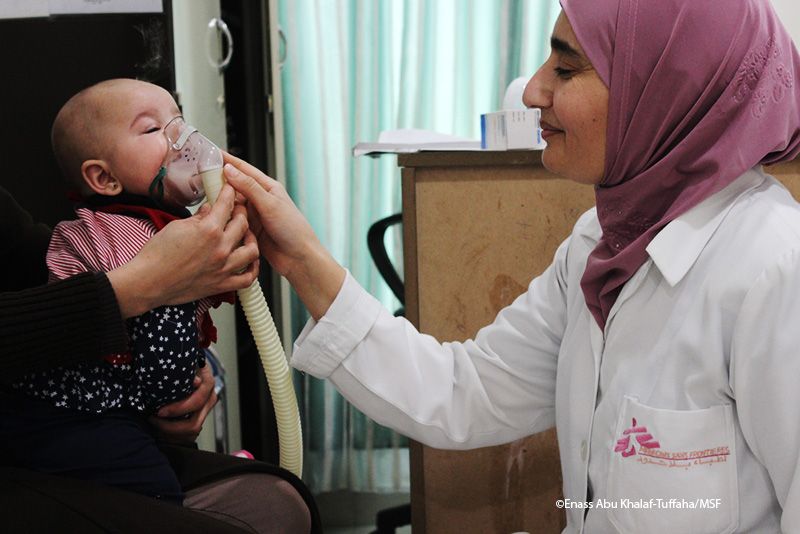With its provision of complex surgery, MSF’s reconstructive surgery programme in Amman gives hope to those who have lost an arm or a leg, or even their face. MSF runs a similarly vital programme in the town of Irbid, a 90-minute drive north of Amman. The maternal and neonatal programme at Irbid hospital helps to save the lives of vulnerable women and infants.
Each month the programme provides care to an average of 2,100 patients in the antenatal unit and attends some 330 deliveries. Just another working day for Arwa Eid, it was quite overwhelming to witness the hustle and bustle of the clinic. Arwa is a nurse in the neonatal intensive care unit (NICU). She told us that her daily schedule kicks off at 8 in the morning with a rapid handover meeting. Arwa and the night shift nurse review cases and various issues as well as any problems that may have come up with the unit during the night.

As we accompanied her on her rounds, she supervised the nursing staff while keeping a watchful eye on the CPAP machine. The NICU team uses a recently developed technology – CPAP – to treat premature babies suffering from pharyngeal airway resistance and other related symptoms. The machine keeps newborns’ airways open so that they can breathe properly.
Eager to further her knowledge of new technologies in the field, this latest innovation is one of the reasons why Arwa wanted to join the MSF team working in Irbid. And the possibility of being involved in a programme with fewer resources and experiencing a different work environment is also very appealing. So, MSF was the right choice for her. When asked if nursing was her first choice of profession, she replied, “I’ve wanted to be a nurse for as long as I can remember.”

On the way from the hospital to the mental health clinic, the huge changes that Amman has undergone since the start of the Syrian conflict were clearly visible. The city is more crowded and there are many newly opened Syrian shops and restaurants. We did not know what to expect at the mental health clinic. As we went in, we saw drawings and colourings on the wall done by children who regularly attend the clinic.
The vast majority of patients treated at the clinic – adults and children alike – are members of the Syrian refugee community living either in or around Irbid. MSF psychologist Saja Qa’aymeh described the challenges she and the team face in their everyday work, “It’s no easy task trying to gain the trust of a 10-year old boy and getting him to confide his thoughts and feelings.” She went on to explain the stigma and negative attitudes shown to people seeking mental health support in the region.
Saja told us that most of her patients are suffering from Post-Traumatic Stress Disorder (PTSD) and depression brought on by what they have been through. Sexual abuse and violence – as much against children as women – are also common.
Never easy to handle, sensitivity is required in treating such cases because of social stigma and traditional attitudes. Saja sees 5 to 8 patients a day. Treating them takes time; it is stressful and necessitates a great deal of effort and energy. So Saja makes sure she disconnects from her work in the evenings and at weekends by doing sporting activities and socialising, which help her to recharge her batteries and prepare for the day or week ahead.
Read more about MSF's activities in Jordan